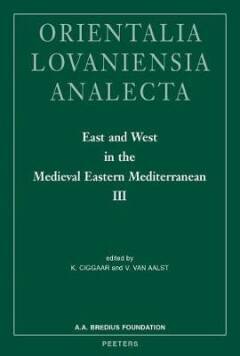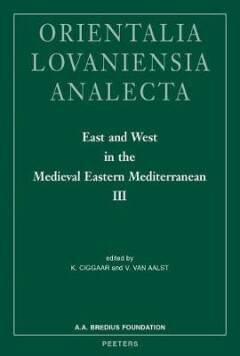
- Afhalen na 1 uur in een winkel met voorraad
- Gratis thuislevering in België vanaf € 30
- Ruim aanbod met 7 miljoen producten
- Afhalen na 1 uur in een winkel met voorraad
- Gratis thuislevering in België vanaf € 30
- Ruim aanbod met 7 miljoen producten
Zoeken
East and West in the Medieval Eastern Mediterranean III
Antioch from the Byzantine Reconquest Until the End of the Crusader Principality
€ 89,00
+ 178 punten
Omschrijving
The complexity of the multi-ethnic and multi-cultural society of the Eastern Mediterranean world asks for research on a wide variety of topics. Three unique documents, preserved or produced in the West, reflect an interest in this world: a Latin-Armenian list of words (Jos Weitenberg), a Middle Dutch Song (Lied) of Antioch, possibly a daughter of the French Chanson d'Antioch (Geert Claassens) and a late sixteenth-century Ortelian map with a panorama of Antioch (Marita Wijntjes). Laments on Antioch and Tripoli are discussed by Tamar Boyadjian and Floris Sepmeijer, who made a new translation of the Arabic text of Solomon of Ashluh. Numerous prophesies on the Fall of Tripoli were brought together (Krijnie Ciggaar). Latins and Eastern Christians, occasionally Mongols, met in the East (Felicitas Schmieder and Alan Murray). Western and Eastern sponsors had their portraits painted in sanctuaries (Mat Immerzeel). In his study, which reads as a detective, Yuri Pyatnicky traces the fate of the two missing cloisonne enamels that once adorned the book cover and the manuscript od the famous Vardzia Gospel.
Specificaties
Betrokkenen
- Uitgeverij:
Inhoud
- Aantal bladzijden:
- 245
- Taal:
- Engels
- Reeks:
- Reeksnummer:
- nr. 269
Eigenschappen
- Productcode (EAN):
- 9789042934061
- Verschijningsdatum:
- 16/04/2018
- Uitvoering:
- Hardcover
- Formaat:
- Genaaid
- Gewicht:
- 789 g

Alleen bij Standaard Boekhandel
+ 178 punten op je klantenkaart van Standaard Boekhandel
Beoordelingen
We publiceren alleen reviews die voldoen aan de voorwaarden voor reviews. Bekijk onze voorwaarden voor reviews.










